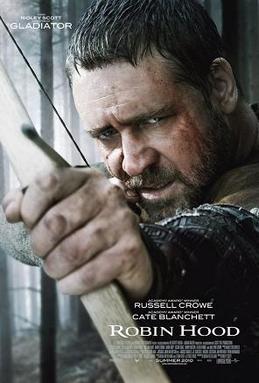 I, for one, am sick of the Robin Hood myth and movies. Or I thought I was. On the latest episode of Mark Kermode’s BBC film review podcast, there’s a fascinating discussion with Russell Crowe and “Billy Bragg” about the upcoming Ridley Scott film Robin Hood, starring (and co-produced by) Crowe. The new movie is a departure from other versions, with Robin Hood involved in the Magna Carta and also the Forest Charter which, “In contrast to Magna Carta, it provided some real rights, privileges and protections for the common man against the abuses of the encroaching aristocracy.” One line I like from the Forest Charter: “Any archbishop, bishop, earl, or baron who crosses our forest may take one or two beasts by view of the forester, if he is present; if not, let a horn be blown so that this [hunting] may not appear to be carried on furtively.”
I, for one, am sick of the Robin Hood myth and movies. Or I thought I was. On the latest episode of Mark Kermode’s BBC film review podcast, there’s a fascinating discussion with Russell Crowe and “Billy Bragg” about the upcoming Ridley Scott film Robin Hood, starring (and co-produced by) Crowe. The new movie is a departure from other versions, with Robin Hood involved in the Magna Carta and also the Forest Charter which, “In contrast to Magna Carta, it provided some real rights, privileges and protections for the common man against the abuses of the encroaching aristocracy.” One line I like from the Forest Charter: “Any archbishop, bishop, earl, or baron who crosses our forest may take one or two beasts by view of the forester, if he is present; if not, let a horn be blown so that this [hunting] may not appear to be carried on furtively.”
The discussion about this with Crowe and Bragg (9:00 to about 32:10 of the podcast) goes into how the Norman aristocracy unjustly invaded the land rights of the common people, which was redressed to some degree by the Forest Charter. Sounds interesting.
Update: see Rand on the Injuns and Property Rights:
See Hoppe, “Of Common, Public, and Private Property and the Rationale for Total Privatization,” as ch. 5 of The Great Fiction, Part II, discussing the right of groups to homestead partial easements of land by use. I have written a bit on some similar matters, about how the English “enclosure” did violate some pre-existing easement rights, so in some sense “property” is “theft” as Proudhon said (meaning property rights decreed legislatively by the state that trampled on pre-existing easement rights).
Creative Common Law Project, R.I.P. and Waystation Libertarians:
From Jamin Hübner, before he became a socialist:
Another myth is more fundamental: that of “free and voluntary exchange” that underlies all market interactions. This individualistic, utilitarian, and neoliberal dogma, repeated ad nauseum by anarcho-capitalist and neoconservative apologists, was perceptively challenged by William Thompson nearly two centuries ago when he observed that people without capital (e.g., tools and materials to produce)—like former serfs who were evicted from the manor during the enclosure movement—have no choice but to sell themselves. “The selling of their labor power was not a free exchange, but was coerced. The threat of starvation was as coercive as a threat by violent means” (E. K. Hunt and Mark Lautzenheiser, A History of Economic Thought, 158).
Gene Epstein and I were discussing this the other day and I observed that it could be argued that this violates the easement rights of the ranchers/hunters, like the enclosure laws that left-libertarians have opposed (“property is theft”). I pointed out that even in Hoppe’s theory you can have group easement rights that are violated by enclosure/fencing. Here is the email I sent him:
Re our brief discussion—Hoppe on group easements: “Of Private, Common, and Public Property and the Rationale for Total Privatization” — see in particular Part II.
Re the Forest charter, enclosures, and so on — Robin Hood, Magna Carta, and the Forest Charter. And how the enclosure movement could be seen as a type of theft of preexisting easements–a la Hoppe’s comments too.
[TLS]














I’ve always seen the Robin Hood legend as something of a misinterpretation. Or perhaps just misinterpreted given the prevailing social views of a particular era. Consider that when he “robbed from the rich to give to the poor”, who they are talking about. The “rich” of that time were the aristocracy (the government). Wealthy private individuals didn’t really exist – even mercantilism wasn’t around yet. In my mind he’s the forerunner to Rand’s Ragnar Danneskjold.
I would prefer a Robin Hood that robs intellectual property from evildoers